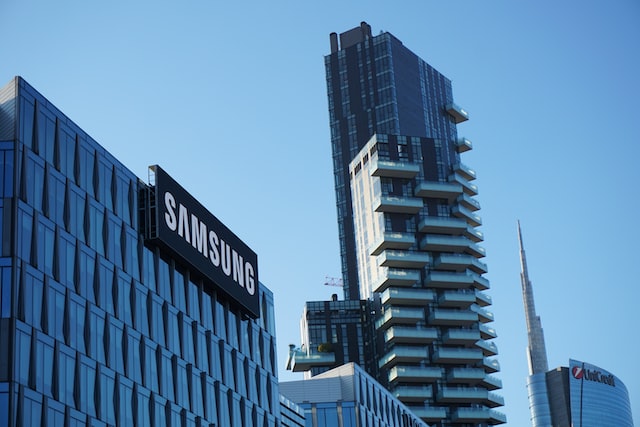Before we dive deep into the PESTEL analysis, let’s get the business overview of Samsung. Samsung is a South Korean multinational conglomerate headquartered in Samsung Town, Seoul. It was founded in 1938 by Lee Byung-Chul as a trading company and has since diversified into various sectors, including electronics, heavy industries, construction, insurance, and entertainment.
Samsung has numerous subsidiaries and affiliated businesses, making it one of the world’s largest and most influential companies.
- Electronics: Samsung Electronics, a subsidiary of Samsung Group, is the world’s largest consumer electronics and semiconductors manufacturer. The company’s product portfolio includes smartphones, tablets, televisions, home appliances, and more. Samsung’s flagship smartphone series, the Galaxy line, is one of the top-selling devices globally.
- Semiconductors: Samsung Electronics is also a leading player in the semiconductor industry, particularly in memory chips (DRAM, NAND flash) and system LSI (Logic Chip). The company is a key supplier to numerous global tech giants, providing them with product components.
- Display technology: Samsung Display, another subsidiary, is a global leader in display technology, producing LCD, LED, and OLED panels for various devices, such as smartphones, TVs, and monitors.
- Heavy Industries: Samsung Heavy Industries is one of the world’s largest shipbuilders, primarily focusing on large-scale commercial vessels and offshore platforms for the oil and gas industries.
- Construction: Samsung C&T is globally involved in construction, engineering, and infrastructure projects. They have been responsible for constructing notable landmarks like the Burj Khalifa in Dubai and the Petronas Twin Towers in Malaysia.
- Finance and Insurance: Samsung operates in the financial sector through Samsung Life Insurance, Samsung Fire & Marine Insurance, and Samsung Card, providing various financial services and insurance products.
- Entertainment: The conglomerate has a presence in the entertainment industry through its subsidiary, SM Entertainment, which manages some of South Korea’s most popular K-pop artists and groups.
- Biopharmaceuticals: Samsung Biologics and Samsung Bioepis are subsidiaries focusing on developing and manufacturing biopharmaceutical products, including biosimilars and novel drugs.
Samsung’s business model is characterized by its focus on vertical integration, innovation, and a solid commitment to research and development. Despite facing challenges from competitors and geopolitical tensions, Samsung remains a dominant player in the global market.
For 2023, Samsung reported KRW 258 trillion ($190 billion) in annual revenue, a record high, and KRW 6.5 trillion ($4.7 billion) in operating profit.
Here is the PESTEL analysis of Samsung
A PESTEL analysis is a strategic management framework used to examine the external macro-environmental factors that can impact an organization or industry. The acronym PESTEL stands for:
- Political factors: Relate to government policies, regulations, political stability, and other political forces that may impact the business environment.
- Economic factors: Deal with economic conditions and trends affecting an organization’s operations, profitability, and growth.
- Sociocultural factors: Relate to social and cultural aspects that may influence consumer preferences, lifestyles, demographics, and market trends.
- Technological factors: Deal with developing and applying new technologies, innovations, and trends that can impact an industry or organization.
- Environmental factors: Relate to ecological and environmental concerns that may affect an organization’s operations and decision-making.
- Legal factors: Refer to the laws and regulations that govern businesses and industries.
In this article, we will do a PESTEL Analysis of Samsung.
PESTEL Analysis Framework: Explained with Examples
Political
- Government Policies: The policies of the governments where Samsung operates can significantly affect the company’s operations. For example, tax policies, labor laws, environmental regulations, trade restrictions and tariffs, and political stability can influence Samsung’s business strategies.
- Trade Agreements: Samsung, being a South Korean company, benefits significantly from the free trade agreements that South Korea has with other countries. These agreements can lower tariffs and make Samsung’s products more competitive internationally.
- Political Stability: Political stability in the countries where Samsung operates is crucial. Instability, such as political unrest, can disrupt Samsung’s operations and supply chain, causing uncertainty and potential losses.
- Intellectual Property Laws: Samsung’s success relies heavily on innovation and technological advancement, making intellectual property rights crucial. Political factors influence the strength and enforcement of these rights. These rights could harm Samsung’s competitiveness if they aren’t adequately protected.
- Regulatory Changes: Changes in technology standards, privacy laws, and data protection regulations can also impact Samsung. For example, changing user data and privacy regulations could affect how Samsung designs and markets its products.
- International Relations: As a multinational corporation, Samsung is affected by the international relations between South Korea and other countries. Political tensions or conflicts can lead to trade restrictions or boycotts that harm Samsung’s sales.
- Labor laws: Political decisions can impact labor laws, affecting Samsung’s workforce strategy.
Economic
- Global Economic Conditions: As a multinational corporation, Samsung is affected by the economic conditions of its countries. For instance, economic recessions or booms in these countries can influence consumer purchasing power and demand for Samsung’s products.
- Currency Exchange Rates: Since Samsung operates globally, fluctuations in currency exchange rates can impact the company’s profits. If the South Korean won strengthens against other currencies, Samsung’s products may become more expensive in international markets, potentially reducing sales.
- Inflation Rates: High inflation rates in certain countries can decrease the purchasing power of consumers, affecting the demand for Samsung products. On the other hand, low inflation may increase purchasing power and increase demand for Samsung’s products.
- Interest Rates: Interest rates can impact Samsung’s costs. For instance, if Samsung has taken loans for its operations or expansion, higher interest rates would increase the cost of those loans.
- Unemployment Rates: Higher unemployment rates typically lead to lower consumer spending, which can reduce demand for Samsung’s products. Conversely, lower unemployment rates might increase consumer spending and demand for Samsung’s products.
- Economic Policies: Government economic policies such as fiscal policy (taxation, government spending), monetary policy (interest rates, money supply), and industrial policy (subsidies, incentives for innovation) can influence Samsung’s operations and profitability.
- Economic Integration: Samsung benefits from the economic integration of different markets, such as the European Union or ASEAN, which can reduce trade barriers and increase market access.
- Consumer Confidence: The level of consumer confidence in the economy can affect their spending habits, impacting the demand for Samsung’s products.
Sociocultural
- Consumer Attitudes and Behaviors: Different societies have different attitudes towards technology, its role in everyday life, and the speed at which they adopt new technologies. Understanding these attitudes is crucial for Samsung to effectively market its products and innovate.
- Lifestyle Trends: Changes in lifestyle trends can impact the demand for Samsung’s products. For example, an increasing emphasis on health and fitness may increase demand for wearable tech like Samsung’s smartwatches that offer health tracking features.
- Demographics: Demographic factors such as population, age structure, income levels, and education levels can influence the market for Samsung. For instance, younger populations might be more likely to adopt new technology products quickly.
- Cultural Differences: Different cultures have different preferences and needs, which Samsung needs to consider when designing and marketing its products. For example, color symbolism varies between cultures, which might affect Samsung’s color options in different countries.
- Social Norms and Values: The norms and values of a society can affect the acceptance and use of Samsung’s products. For instance, communities concerned about privacy may be more cautious about using smart devices.
- Education Levels: Higher education levels often correlate with higher technology adoption rates, which could increase the market for Samsung’s products.
- Environmental and Social Responsibility: Consumers are increasingly concerned about the social and environmental impact of the products they buy. Samsung’s commitment to environmental sustainability and ethical practices can influence consumers’ perceptions and purchasing decisions.
- Changing Work Patterns: With the increased remote working, there might be an increased demand for certain products like tablets, laptops, and smartphones.
Technological
- Technological Innovation: Technological innovation in the electronics industry is rapid. Samsung must continually invest in R&D to keep up with new technologies, from advancements in screen technology (like OLED and Micro-LED) to developments in artificial intelligence, 5G, IoT, etc.
- Technological Obsolescence: Given the rapid pace of technology change, products can become obsolete quickly. Samsung must manage its product lifecycle effectively to minimize losses from obsolete inventory and maintain its competitive edge.
- Adoption of New Technologies: How quickly and effectively Samsung can adopt and implement new technologies can impact its market position. This includes technologies used in its products and those used in manufacturing processes.
- Technological Infrastructure: The state of technical infrastructure in Samsung’s markets can affect its sales. For example, a region’s rollout of 5G networks can influence the demand for 5 G-capable smartphones.
- Digital Transformation: Advances in digital technologies are transforming how businesses operate. Samsung must adapt to these changes in e-commerce, digital marketing, remote working, and digital services.
- Cybersecurity: With increasing digitization and connectivity, cybersecurity threats are a significant concern. Samsung must ensure robust security features in its devices and protect its information systems from cyber threats.
- Regulatory Changes in Technology: Changes in technology-related regulations can impact Samsung. This includes regulations around data privacy, AI, digital rights, etc.
- Patents and Intellectual Property: Patents and IP rights are crucial in the tech industry. Samsung must navigate this landscape effectively to protect its innovations and avoid infringing on the rights of others.
Environmental
- Climate Change: Climate change can impact Samsung’s operations, especially its supply chain and manufacturing processes. For instance, climate-related disasters can disrupt the supply chain, and regulatory responses to climate change (like carbon pricing) could increase operational costs.
- Waste Management: Electronic waste is a significant environmental issue, and Samsung, as a major electronics manufacturer, is expected to manage this responsibly. This includes designing products for easier recycling and offering take-back programs for old devices.
- Energy Efficiency: There is increasing consumer and regulatory focus on the energy efficiency of electronic devices. Samsung must ensure its products are energy-efficient to comply with regulations and meet customer expectations.
- Resource Scarcity: Some electronic device resources are scarce or associated with environmental and social issues (like conflict minerals). Samsung must manage its resource use responsibly to ensure supply and protect its reputation.
- Pollution: Manufacturing processes in the electronics industry can contribute to pollution (like air and water pollution). Samsung must manage this to comply with environmental regulations and meet increasing consumer expectations for environmentally-friendly practices.
- Green Products: There is a growing demand for “green” products with a lower environmental impact. Samsung can tap into this demand by designing products with lower environmental impact, such as recycled materials.
- Environmental Regulations: Regulations related to environmental issues (like carbon emissions, e-waste, energy efficiency, etc.) can impact Samsung’s operations, product design, and marketability.
- Social Pressure: Consumers and society, in general, are increasingly concerned about environmental issues, and companies are expected to demonstrate their environmental responsibility. Samsung’s environmental reputation can influence its brand image and customer loyalty.
Legal
- Product Safety Regulations: Samsung must ensure that all its products meet safety regulations in every market. Failure to comply could result in product recalls, fines, and brand reputation damage.
- Intellectual Property Laws: As a tech company, Samsung must protect its innovations through patents, trademarks, and copyrights. It also needs to ensure it doesn’t infringe on the IP rights of others, which could lead to legal disputes.
- Employment Laws: Samsung must comply with labor and employment laws in its operating countries. This includes laws related to wages, working hours, health and safety, and discrimination.
- Data Protection and Privacy Laws: With many of its devices storing or processing personal data, Samsung must comply with data protection and privacy laws, such as the General Data Protection Regulation (GDPR) in the European Union.
- Environmental Laws: Samsung has to adhere to various environmental laws and regulations concerning waste disposal, recycling, energy use, and pollution. This is particularly relevant given Samsung’s role as a major electronics manufacturer.
- Anti-Trust Laws: Samsung must comply with antitrust and competition laws to prevent unfair business practices and promote fair competition.
- Trade Regulations: As a global company, Samsung is subject to various international trade regulations, including export controls, tariffs, and sanctions.
- Consumer Protection Laws: These laws protect consumers from unfair business practices. Samsung must adhere to these laws in all areas, including advertising, product safety, and customer service.











